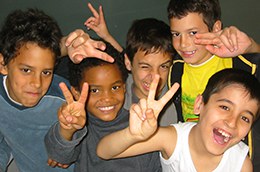Images of 'Intercultural Education'
Study «Images of intercultural education»

How teachers see reality determines how they perceive inter-cultural challenges at school and in their teaching. In the sense of intercultural sensitivity to different distinctions, the perceptions of differences and similarities can develop and are determined by the teachers' own experiences within the social settings and values. Intercultural challenges at school and in the classroom are characterised by meetings that do not take place in a neutral place: instead the teachers have to consider their own role and the function of the school as an institution. Compulsory schooling, established as an important part of modern society, traditionally contributes to the consolidation of a cultural unit in a community, making monoculturality the aim and programme of education. This type of monocultural institution is in contradiction to the recognition and value of diversity as the prime educational objec-tive. The project began at this point, aiming at an empirical reconstruction of this field of tension in teachers' educational convictions. It raised the question of how teachers view and reflect on cultural differences in their own school context, and how they handle conflict between cultural heterogeneity, on the one hand, and the normative function of school, on the other hand; and how educational views differ depending on different intercul-tural sensitivities.
Interviews with teachers about a hypothetical dilemma were evaluated and the data was classified according to different levels of intercultural sensitivity (using the Intercultural Development Inventory). This has shown that teachers handle conflict differently depending on their intercultural sensitivities. The results identified the significance of intercultural sensitivity for educational convictions about cultural heterogeneity, making it possible to determine what factors might influence the development of a school-specific intercultural competence for teachers.